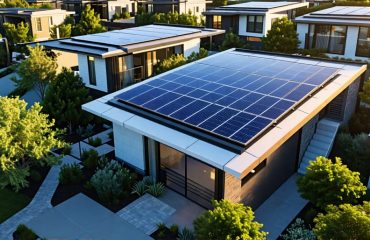Assess your energy needs to determine the right size for your solar storage system. Start by calculating your household’s average energy consumption, which will guide you in selecting a battery system that meets your needs effectively. Explore government incentives and rebates available for installing a solar storage system to maximize cost savings and expedite return on investment. Pair your solar storage with an efficient solar heating system to further reduce energy costs and enhance sustainability. Choose reputable installers with proven expertise and customer reviews to ensure a seamless installation process and reliable system performance. Avoid common misconceptions by understanding that solar storage works effectively irrespective of weather conditions by tapping into stored energy during cloudy days or outages. Embrace solar storage to not only reduce your energy bills but also contribute to a more sustainable future.
The Basics of Solar Storage Systems

Understanding Solar Batteries
Solar batteries play a crucial role in solar energy storage by capturing and storing unused solar power for later use. This allows homeowners to tap into their solar energy reserves during non-sunny hours or power outages, maximizing their energy savings and promoting a more sustainable lifestyle. Common types of solar batteries include lithium-ion and lead-acid. Lithium-ion batteries are popular for their high efficiency and longer lifespan, while lead-acid batteries have a lower upfront cost. These batteries store energy through a chemical reaction process when solar panels collect sunlight. When energy demand is high, the stored power is converted back to electricity for household use. By providing backup power and reducing reliance on the grid, solar batteries can lead to significant savings on energy bills. Contrary to some myths, solar storage systems are not overly complex or difficult to maintain, making them an attractive option for eco-conscious homeowners seeking both environmental and financial benefits.
How Solar Storage Integrates with Home Systems
Solar storage systems integrate seamlessly with a home’s electrical setup to enhance energy efficiency. By working alongside solar panels, these energy storage systems store excess solar energy generated during the day for use during peak demand times or at night. This coordination reduces reliance on traditional power grids and provides reliable backup during outages. Homeowners not only gain increased energy independence but can also enjoy significant savings on their electricity bills. With solar storage, your home becomes a more sustainable haven, maximizing clean energy use while minimizing environmental impact.
Benefits of Solar Storage for Homeowners
Energy Independence and Bill Reduction
Investing in a solar storage system can significantly enhance your home’s energy independence while slashing energy bills. By storing excess solar energy during the day, you tap into a renewable energy source even after the sun goes down. This means less reliance on the grid, protecting you from rising electricity costs and outages. Essentially, you become the hub of your own energy network—a mini power station in your backyard.
Imagine running your home mostly on free solar power, drastically reducing the amount you need from the utility company. This autonomy not only offers peace of mind but substantial financial benefits, as you can significantly cut down your electricity expenses. Additionally, many utility companies offer incentives for generating solar power, ensuring further savings and sometimes even earning back some of your investment.
The myth that solar systems lack night-time utility is debunked with storage solutions, showcasing their 24/7 reliability. Whether for environmental reasons or financial gain, solar storage boosts both sustainability and your bank balance, making it a smart choice for any homeowner.

Environmental Impact and Sustainability
Solar storage systems play a pivotal role in creating a sustainable living environment by transforming how we consume and store energy. By harnessing the abundant power of the sun, these systems allow homeowners to significantly reduce their reliance on non-renewable energy sources. This shift not only helps decrease carbon footprints but also contributes to a cleaner, more environmentally friendly future. Installing a solar storage system at home means you can store excess solar energy generated during the day, utilizing it when the sun isn’t shining. This capability not only maximizes the use of renewable energy but also ensures energy independence, protecting against fluctuating electricity prices and outages. Moreover, homeowners can enjoy substantial savings on their energy bills, debunking the myth that sustainable living is necessarily more costly. Embracing solar storage is a practical step forward for those wishing to make a personal impact on reducing greenhouse gas emissions and championing a greener lifestyle.
Enhanced Home Resilience and Backup Power
Imagine never worrying about power outages again. With a solar storage system, your home becomes a bastion of resilience. These systems capture energy from the sun and store it for when you need it most. During unexpected outages, they seamlessly provide backup power, keeping your lights on and essentials running. This means no more spoiled food or uncomfortable nights. Besides offering peace of mind, solar storage helps cut energy costs by using stored solar power when rates are high. This not only benefits your wallet but also significantly reduces your carbon footprint, making your home both reliable and environmentally friendly.
Debunking Myths about Solar Storage
Myth: Solar Storage Is Too Expensive
Many homeowners believe that solar storage systems are too expensive, but this myth overlooks the substantial benefits and opportunities they offer. While the upfront costs might seem daunting, the long-term savings on your energy bills can be significant. By storing the excess solar energy your home generates during the day, you can utilize it during peak hours when electricity is costlier, thus reducing your reliance on the grid and cutting down electricity expenses.
Moreover, numerous financial incentives and rebates can help offset initial costs. Federal tax credits, state-specific programs, and local rebates are often available to lower the price of solar storage installations. Additionally, many companies now offer flexible financing options, such as solar loans or leasing plans, making solar storage more accessible than ever before. With these options, you can start saving on energy costs immediately without the need for a hefty investment upfront.
Ultimately, investing in solar storage not only enhances your home’s sustainability but also contributes to long-term financial benefits, making it a wise decision for environmentally-conscious homeowners.
Myth: Limited Technology and Efficiency
Many homeowners believe that solar storage systems are limited by outdated technology and inefficiency. However, recent advancements have made these systems highly effective solutions for modern homes. Today’s solar storage systems are equipped with cutting-edge lithium-ion batteries, similar to those used in electric cars, allowing for greater energy retention and durability. Additionally, advancements in battery management systems ensure optimal performance and longer lifespan, increasing reliability and efficiency.
Incorporating solar storage in your home not only maximizes the use of your solar power but also helps reduce energy bills significantly. By harnessing and storing energy during peak sunlight hours, homeowners can operate off-grid during evening hours when electricity rates are higher, ultimately leading to substantial savings. Moreover, these systems empower homeowners to contribute to a greener planet by minimizing reliance on traditional energy sources. The myths of limitations are outdated; today’s solar storage solutions are more efficient, accessible, and beneficial than ever before.

Choosing the Right Solar Storage Solution
Choosing the right solar storage solution is crucial for maximizing the efficiency and benefits of your solar energy system. For homeowners aiming to achieve sustainable living while keeping costs in check, several factors should guide your decision. First, consider the capacity of the storage system. You’ll need a battery that can store enough energy to cover your usage needs during periods when solar panels aren’t producing electricity, like cloudy days or nighttime. This requires an understanding of your energy consumption patterns, which can be gleaned from your utility bills or energy audits.
Budget is another essential consideration. While investing in solar storage can reduce electricity bills over time, upfront costs can vary widely. It’s critical to balance cost with performance by researching different options and possibly leveraging subsidies or tax incentives that make these systems more affordable. Be sure to compare the return on investment among various battery technologies, such as lithium-ion and lead-acid, to find one that matches your financial and environmental goals.
Future scalability should also be part of your decision-making process. As your household’s energy needs change—whether due to the addition of an electric vehicle or home improvements—your solar storage system should be able to adapt. Choose a solution that allows you to expand storage capacity or integrate new technologies over time.
Ultimately, the best choice for solar storage is one that aligns with your current requirements and future ambitions for sustainable living. By carefully evaluating these factors, you can ensure your solar energy system is as effective and beneficial as possible, empowering you to reduce both your environmental footprint and energy expenses.
Conclusion
In conclusion, solar storage systems represent a pivotal advancement in home energy management. By integrating these technologies, homeowners not only take a significant step towards enhancing their energy efficiency but also embrace a path to a more sustainable and cost-effective lifestyle. Investing in solar storage can transform how you manage and use energy, offering notable reductions in energy bills and ensuring greater energy independence. It’s important to debunk common myths around solar storage systems; they are not only accessible but also financially beneficial in the long run. For those interested in maximizing their home’s efficiency and cutting down on utility costs, exploring solar energy management is an excellent start. This journey towards sustainability guarantees a cleaner future and solidifies your home as a reliable energy producer. Make the choice today—a brighter, cleaner tomorrow is within reach with solar storage solutions.









